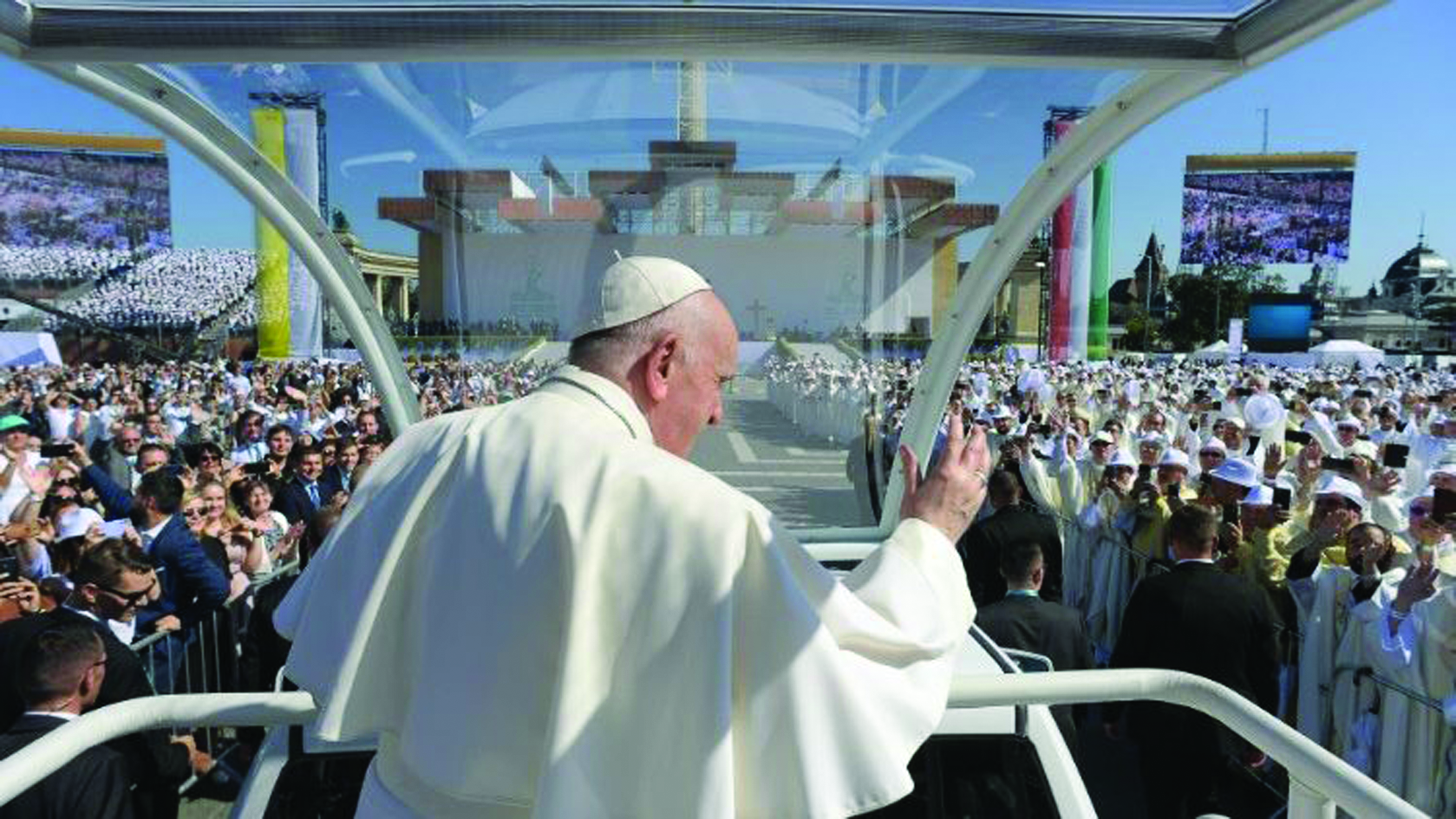Cardinal Laurent Monsengwo Pasinya, archbishop of Kinshasa, the capital of the Congo, preached at the Lenten retreat attended by Benedict XVI and the Curia.
It would definitely be wrong to say that Benedict XVI is not attentive to the life of the Church in Africa just because no African bishops featured among the cardinals appointed in the latest consistory in February. In the previous consistory, for example, four bishops of that young and enthusiastic Church which invited the Pope to Africa twice were raised to the cardinalate. Because of his love for Africa, Benedict XVI has so far entrusted two African cardinals with the preaching of the Vatican’s annual Lenten spiritual exercises —first Cardinal Francis Arinze from Nigeria, a man from the Curia, and then this year, Congolese Cardinal Laurent Monsengwo Pasinya, archbishop of Kinshasa.
Pasinya often played an important social role in the Democratic Republic of Congo. Monsengwo means chief’s grandson, and his is one of the royal families of Baskata. In the 1990s, this family saw the former Zaire through the difficult political phase which led to the fall of Mobutu’s dictatorship. In December, he protested against the result of the presidential election which re-elected President Joseph Kabila: “The results announced by the election board are neither true nor fair,” said Cardinal Monsengwo. The situation is still unsettled, as no choice has been made between the calling of a new election and the validation of Kabila’s election until the rules are changed; meanwhile, the country is being devastated by cholera and measles epidemics and undermined by total political instability fomented by foreign interests.
Mosengwo Pasinya is the bishop of the people of the Great Lakes, who have been suffering for decades. He was the first special secretary in a Bishops’ Synod, as he is a talented Biblicist. The Synod on God’s Word also emphasized the teaching of the Bible in Africa. “In Africa,” said the cardinal in an interview with Jesus Magazine, “inculturation came almost naturally, through the use of tales and proverbs; as for the announcement of the Gospel, the most difficult concept was that of the Church as God’s family.”
The cardinal has never made a secret of the most burning social and political issues and of attempts at exploiting and marginalizing Africa: “Peace goes hand in hand with justice, justice with law and law with truth,” he said during the second African Synod in October 2009. On that occasion, he reported on the implementation of the indications of the 1994 first continental Synod.

During his weeklong Lenten retreat Benedict XVI kneels in prayer in the Redemptoris Mater Chapel in the Apostolic Palace on February 26 (CNS photo)
Having been entrusted with the task of preaching the spiritual exercises, he chose a topic based on the words of St. John the Evangelist. In his First Letter, John declares his intention to speak about “the experience of faith which the Apostles had of the word of life, which was with the Father and was manifested to them becoming a man.” The cardinal commented: “The Apostles in fact heard, contemplated and touched Him with their hands. John relates this experience so that his Christian readers may be in communion with the Apostles, as they are with the Father and His Son Jesus Christ.” The cardinal developed this idea of communion and provided guidelines to enable believers to achieve, develop and live this communion. The retreat’s introduction on Sunday evening started with the sign of the cross. The cross “kills egoism and enables us to accept God’s salvation plan, to get faith through mercy,” he said.
The freshness of Africa thus entered the Redemptoris Mater Chapel: “The freshness of acceptance of life which is to be found in Africa,” said the Pope on his way to Benin, “these young people full of hope and enthusiasm, but also of joy and humor, show that there is a reserve of human energy, a freshness of hope and religious feeling; there is still a perception of metaphysical reality, of reality as inseparable from God: not a perception in purely physical terms which limits and withers our lives and kills hope.”
“At the end of these days of prayer and listening we must express our gratitude,” said the Holy Father after this week of preaching.
Benedict XVI’s gratitude was addressed to the preacher for his exegetical competence and “the beautiful stories, mainly from his dear Africa, which delighted and supported us.” One of them in particular touched the Holy Father’s heart. “I was particularly affected,” said the Pope, “by the story about one of your friends who, having gone into a coma, felt as if he were inside a dark tunnel, but at the end of it he could see some light and most of all hear beautiful music. To me this sounds like a parable of our life: we often find ourselves in a dark tunnel in the middle of the night, but thanks to our faith we finally see a light and hear beautiful music, perceive the beauty of God, of heaven and earth and of all creatures; it is true, spe sumus salvati (‘we are saved by our hope’).” In conclusion the Holy Father said: “You have confirmed us in our faith, hope and charity.”
In his official letter of acknowledgment Benedict XVI recalled: “The silence and prayer of these days, the Eucharistic adoration in particular, have been full of deep thankfulness to God for the great love he gave us.” It was just the style and spirituality of Africa that the Pope appreciated: “A spiritual heritage which is a great treasure for all of God’s people and the whole world, especially with a view to the new evangelization.” A way to that exchange of gifts “which is one of the most beautiful aspects of ecclesial communion, where people from different cultures and parts of the world express themselves within the unity of the mystical body of the Church.”






Facebook Comments